For almost a half century, Fidel Castro has bedeviled 10 successive American Presidents with his defiantly socialist rhetoric and dictatorial control over Cuba. In fact, despite coup attempts (Bay of Pigs), CIA assassination plots (exploding cigars) and economic sabotage (the ongoing embargo), American leaders have been unable to humble Castro or undermine his rule.
Indeed, it is a testament to his political genius (and presumptive 9 lives) that just as he was a burr in President J.F. Kennedy’s Cold War sphere of influence throughout the Americas, Castro remains a spur in President G.W. Bush’s crusade to spread democratic values around the world. And, political economists have wondered for decades what credible challenges Castro would have posed to America’s regional hegemony if he had independent economic resources to back up his socialist political philosophy.
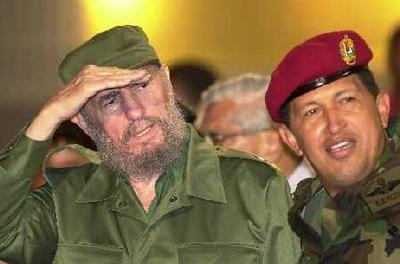 Lion in winter Fidel Castro with his political cub Hugo Chávez surveying the region for socialist prey…
Lion in winter Fidel Castro with his political cub Hugo Chávez surveying the region for socialist prey…
Well, they need wonder no more because President Hugo Chávez of Venezuela seems poised to challenge America in ways no one could ever imagine Castro mounting. Chávez has made no secret of his devotion to Castro. But where Castro’s dependence on foreign aid limited his regional influence, Chávez has the wealth of Saudi oil sheiks to not only fund a Bolivarian revolution in his country but also support socialist revolutions in other Latin American states. (Venezuela’s Petróleos de Venezuela (PDVSA), the state oil monopoly, is the world’s fifth largest oil exporter, producing 3.1 million barrels a day.) In fact, he telegraphed his regional aspirations by publicly criticizing the Central American Free Trade Agreement (CAFTA) that President Bush signed on Tuesday as a “perverse [agreement that] would harm the economies and societies much more in our sister Central America”.
Chávez insists that his ideology does not adhere to any of the failed models of communism. Instead, he says that he wants to “transcend capitalism [by creating a] socialist, humanist, egalitarian economy”. Nevertheless, it is not surprising that Castro has actually anointed him to lead the crusade to spread socialist values throughout the region.
Indeed, there is already clear and convincing evidence that Chávez has embraced his mission with zealous determination and remarkable political skill. After all, having survived a CIA sponsored coup d’état, he’s already demonstrated that – like Castro – he has more than one life to give to his cause. (However, he cannot sleep easily at night since he seems convinced that Bush is still trying to kill him.)
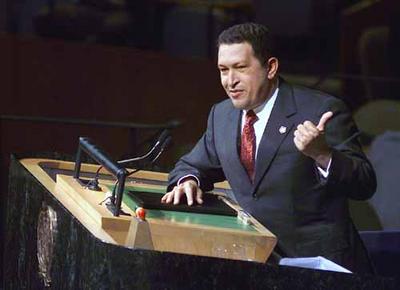 Chávez exuded such charisma and political savvy at the UN Millennium Summit in 2000 that he even impressed the very dynamic U.S. President Bill Clinton.
Chávez exuded such charisma and political savvy at the UN Millennium Summit in 2000 that he even impressed the very dynamic U.S. President Bill Clinton.
Even more impressive, however, was his first challenge to America’s regional influence: Almost every leader in the Americas has always deferred to America’s choice to head of the Organization of American States (OAS). But when that position became vacant last year, Chávez shocked regional leaders by mounting an aggressive campaign to challenge Bush’s candidate to fill it. And, to the revolutionary enlightenment of everyone involved (especially the Americans), Chávez proved not only a worthy political adversary but also a charismatic provocateur who empowered many erstwhile deferential regional leaders to question the value of their blind support of American presidents. Indeed, Chávez’s candidate, fellow avowed socialist Jose Miguel Insulza of Chile, is now the presiding head of the OAS.
(It is also intriguing to note that many political experts suspect Chávez of inciting traditional American allies like Mexico and Canada to expand bilateral relations with America’s perennial nemesis Cuba and defy America by opposing Bush’s invasion of Iraq.)
The enemy of my enemy is my friend:
But Chávez is distinguishing himself far more by using his wealth to win new friends and influence political allies (just as American presidents have done all over the world) than by plotting confrontations with the United States. In this regard, he has used his oil reserves to solidify ties with fellow socialists in Chile, Uruguay, Brazil and Cuba (exchanging cheap oil for Cuban doctors and nurses to provide medical care for Venezuela’s poor). And, he has used oil to court new friends as follows:
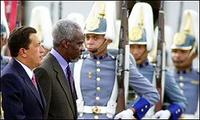 Chávez being welcomed by the Head of CARICOM Jamaican President PJ Patterson on a state visit in the Caribbean where he offered discounted supplies of oil under his PetroCaribe Initiative;
Chávez being welcomed by the Head of CARICOM Jamaican President PJ Patterson on a state visit in the Caribbean where he offered discounted supplies of oil under his PetroCaribe Initiative;
Chávez being welcomed by President Jiang Zemin on a state visit to China where he traded oil for Chinese investments in Venezuela’s infrastructure;
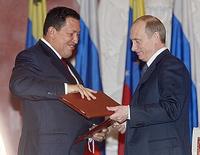 Chávez consummating deals with Russian President Vladimir Putin to purchase of sophisticated military arms;
Chávez consummating deals with Russian President Vladimir Putin to purchase of sophisticated military arms;
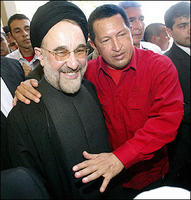 Chávez becoming fast friends with Iranian President Mohammad Khatami on a visit where he signed “22 cooperation and integration agreements in the areas of oil, gas, petrochemicals, technology, construction, and agriculture”.
Chávez becoming fast friends with Iranian President Mohammad Khatami on a visit where he signed “22 cooperation and integration agreements in the areas of oil, gas, petrochemicals, technology, construction, and agriculture”.
At home, Chávez is proving an even greater force to be reckoned with. Indeed, despite persistent civil unrest (trade union strikes) and a recall referendum against his presidency, he now enj
oys almost mythic popularity not only in Venezuela (polling above 70%) but also amongst the poor throughout Latin America and the Caribbean (which, of course, is most troubling to Bush and his remaining allies in the region). Moreover, to reinforce his populism (Chavismo), Chávez has bought the loyalty of the armed forces by appointing military officers to more than 500 senior government jobs, including nine state governorships. Understandably, these developments have rendered his political opponents (comprised primarily of Venezuela’s shrinking middle class and business elites) dispirited and irrelevant.
Of course, it should come as no surprise that Chávez’s socialist rhetoric of cradle-to-grave welfare resonates with the poor. But he really earned his populism bona fides by proudly defying the International Monetary Fund (IMF). After all, it is widely known that IMF director Rodrigo Rato admonished him to bank Venezuela’s unexpected windfall from high oil prices as foreign reserves. But instead, Chávez is funneling much of that oil money into literacy, health and social programmes. Indeed, as his director of PDVSA, Hugo Moyer, declared recently:
“The resources put into education, health, food and into creating stable, productive, well-paid jobs, should not be classified as expenditure. It should be seen as an investment in people. This country, like many others in Latin America, has a huge social debt to its population.”
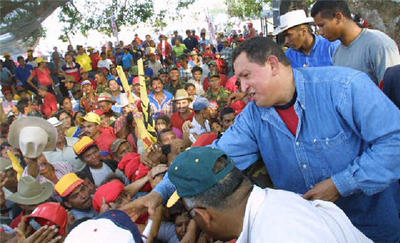 Chávez cultivating his ties to the people by giving land titles and farm equipment to peasant farmers as if he were a latter-day Robin Hood…
Chávez cultivating his ties to the people by giving land titles and farm equipment to peasant farmers as if he were a latter-day Robin Hood…
It is instructive to note that at a time when Bush is championing the virtues of capital markets and privatization of national resources, Chávez is pioneering state sponsored economic development and social justice as prescriptions for sustainable growth. Moreover, he has warned that he will soon execute his socialist version of eminent domain by confiscating over 700 “unproductive” private companies and land holdings for public use as a “nucleus of endogenous development” (co-operatives) for the poor “to fight poverty and end Venezuela’s dependence on the perverse model of capitalism”.
His critics argue that Chávez is merely expropriating property in a Robert Mugabe-style land grab. (No doubt Mugabe is flattered by the allusion.) But Chávez has declared it a “war on the latifundio” (or rich estate owners), casting himself as a latterday Robin Hood of the Amazon Forest. In fact, his agrarian land reform has more in common with U.S. President Lincoln’s Homestead Act than with Mugabe’s redistribution of white-owned farmland to Black political cronies who had no interest in (or skill for) farming, whatsoever.
Incidentally, in addition to his land reforms, Chávez has also funded a new state airline, a phone company, a cement firm and a television news channel (a Venezuelan CNN) “to spread his message across Latin America” (which he does religiously in a four hour Bolivarian sermon every Sunday).
When questioned about the wisdom of rejecting the (tried and wanton) economic gospel of the IMF, Chávez offered a little gospel of his own:
“Either capitalism, which is the road to hell, or socialism, for those who want to build the kingdom of God here on Earth.”
Now, who can argue with that!
(Of course what happens to Venezuela’s Garden of Eden when oil prices fall – as they inevitably will – is a question only for doubting Thomases.)
News and Politics
Anonymous says
who knew? with so much media attention being paid to shit like runaway brides and lost in aruba teenagers it’s great to have access the kind of informative and important stuff you write. thanks
anonymous says
More people like u eed to send the right message out there. give the facts and not information fraught with bias and malicious intent. give credit where it is due regardless of ur political or personal perspective and that sir is what u have done. keep up the good work and continue doing things the way you are that they have meaningful implications and not the empty shell of a life many bully nations try to impose on smaller more communal economies and countries.
amadeus seitz says
keep bringing me this and there will be a job for you